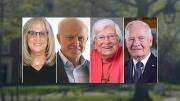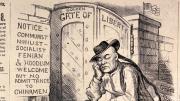“You’ve learned a great deal,” U.S. Attorney General Eric H. Holder Jr. told members of the Harvard Law School (HLS) class of 2012 at their Class Day ceremonies on May 23. “But now…”, he continued, “it’s time to face a difficult truth. …[T]he question today is not what you know, but what this knowledge can empower you to achieve—and to contribute.”
Service to justice was a recurring theme of Holder’s speech, in which he invoked many figures from the school’s storied history, from Charles Sumner to Oliver Wendell Holmes (the ceremony is held on the school’s Holmes Field), to the current President and First Lady of the United States.
Holder, a graduate of Columbia and Columbia Law School, quickly demonstrated that he knew a lot about contemporary life at HLS and the class of 2012 as well—right down to the fact that he was fourth to be asked (after Jon Stewart, Stephen Colbert, and Tina Fey) to speak at the occasion. “I hope you won’t be offended by the research I have done to prepare my remarks” said the leader of the Department of Justice, before reading aloud the opening lines to a letter granting him admission to HLS years ago. “So,” he quipped, “you guys weren’t my first choice, either.”
“The truth is,” Holder continued, “that I wouldn’t have missed this moment—and this opportunity to speak to so many of tomorrow’s legal scholars, advocates, judges, jurists, and policymakers….” He emphasized the “ideal” that “must now become your common cause: not merely to serve clients or to win cases, but to do justice.” He challenged them to reach for a “vision of a better world.”
“The important thing,” he said, invoking Supreme Court Justice Oliver Wendell Holmes, Jr. (son of the Holmes for whom the aforementioned field is named), “is to stay true to yourself, to summon the courage of your convictions….” Holmes, a member of the HLS class of 1866 who was known as “the Great Dissenter” because he often was in the minority on important cases, “knew his country faced a long period of healing and reconciliation following a catastrophic civil war—a war of which he was a decorated veteran,” said Holder, “like several members of the class of 2012.”
Holder praised Holmes’s dedication to principle and urged the class to learn from his example of public service.
“Never doubt that you are among our nation’s most qualified young people and our best prepared to lead, to serve, and”—he emphasized—“to give. Always have faith that transformative change is possible.” It is “your great privilege and breathtaking opportunity,” he concluded, “to create a world that is committed to justice, and that reflects your aspirations for a brighter future.”








